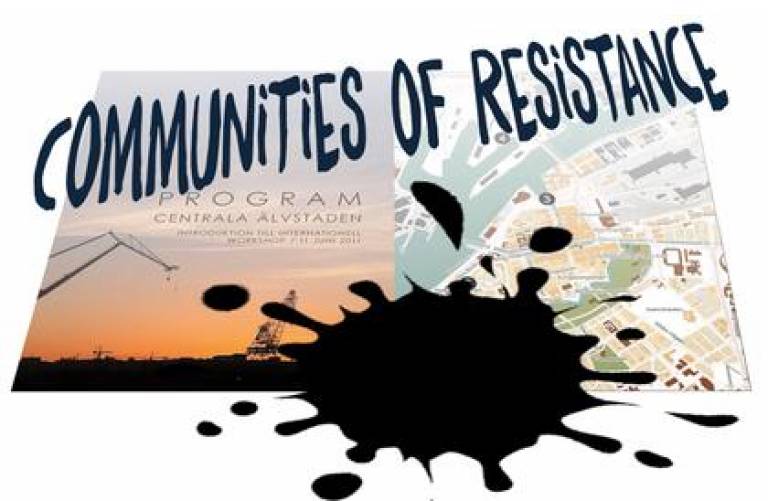LIVINGMAPS Seminar 6: Communities of Resistance
08 July 2014, 6:00 pm–8:30 pm

Event Information
Open to
- All
Location
-
Pearson Room G22 (North East Entrance), UCL, Gower Street WC1E 6BT
In many urban contexts regeneration has become
synonymous with gentrification; it has also provoked different forms of
resistance, from fully fledged social movements, to single area campaigns and
individual protests. This seminar looks at some local case studies of
contemporary regeneration, at how communities of resistance came into existence
and the role of 'counter mapping' in this process.
Click on the image for a full programme (pdf).
Speakers:
Michael Edwards The New Metropolitan Mainstream
Katarina Despotovic Gentrification, City Branding and the Engineering of Enchantment: The Case of 'Centrala Älvstaden in Gothenburg, Sweden
Martine Drozdz Mapping (in)visible Communities of Resistance in London
Tickets:
Professional/academic: £20
Concessions (full time students, the unemployed and people living on a pension): £5
To book tickets please visit the eventbrite page.
Programme notes
The New Metropolitan Mainstream: can we map London in an international comparative framework? / Michael Edwards
This talk summarises the origins and intentions of an un-funded collaboration among activists and scholars in dozens of cities around the world: The New Metropolitan Mainstream (NMM). This is a project of the International Network for Urban Research and Action (inura.org) founded 25 years ago and draws its inspiration both from theoretical discussions (Lefebvre via Schmid, Mayer, Harvey) and activist experiences in cities as varied as Berlin, Addis Ababa, Medellin, Florence... Teams in some of the cities are collaborating to produce maps and texts which examine processes of capitalist urban transformation, commodification, displacement and also patterns and episodes of resistance-counter-moves by citizens.London lacks a contributing team so far, and may have missed the chance of figuring in an initial book-form version of the project but it would not be too late to contribute.
The talk will summarise the key dimensions and variables in the studies, illustrating with examples and soliciting support.
Urban Regeration as City Branding, Gentrification and Enchantment Engineering. The Case of "Centrala Älvstaden" in Gothenburg, Sweden / Katarina Despotovic
Gothenburg, the second largest city in Sweden, are undergoing a class remake of the city that not only displace working class housing from its central parts but also privileges and normalizes whiteness. The case of Kvillebäcken shows how an area formerly defined as remote was redefined as central during a new phase of remaking of the central city. By an imaginary redrawing of the city map the local political and economic elite decided to exploit and invest in this area. There were colonial dimensions in the rhetoric of the redevelopment as it was presented as an expansion into "unexploited and uninhabited areas". Further, before the demolition of the existing buildings, policy-makers and investors stigmatized it as a no-go area, "the Gaza strip of Gothenburg" as they called it, which legitimized the demolition. In close cooperation between authorities from the municipality and private investors a takeover of the area was possible and the former users of the land - who had invested money, resources and time - were displaced. The area had functioned as a recycled industrial area with mosques, flea markets, immigrant associations and small businesses, a meeting point for people from the poor suburbs. The area has now been recognized within policy networks as a display window for sustainable urban development. The stigmatization of the area, as well as the loss of the area for immigrant and working class communities, further marginalized their position in the city.
The (in)visibilities of communities resisting gentrification in London/Martine Drodz
This presentation will offer a critical exploration of different cartographic documents produced while working with various groups involved in strategic action against some adverse effects of regeneration in London. From maps of gentrification showing the contemporary modalities of the privatisation of public assets to the attempt to map contentious activities around regeneration projects using newspapers digital archives, it will reflect on the public (in)visibility of communities in resistance in contemporary London.
About the speakers
Michael Edwards has written and researched widely on issues of urban governance and regeneration and is internationally recognised as a leading authority on the political economy of planning. He is a founder member of the Just Space network and INURA and has been involved in numerous campaigns , most recently in relation to the redevelopment of Kings Cross. He is the author of Just Space: Towards a sustainable London (2014).
Katarina Despotovic is a photographer with long experience with documentary photography, publishing work in daily and weekly newspapers. She has had several exhibitions showing her work from the war in former Yugoslavia and of refugees in Sweden. With a degree in Culture Studies 2009 she started working on the research study presented here and led by sociologist Catharina Thörn at Gothenburg University. This work will result in a book due in 2014.
Martine Drozdz is completing a PhD in Geography and Urban Planning at Université de Lyon in France. While teaching at LSE in French Studies she carried out a study on the politics of regeneration and its discontents, looking at the development of major and medium scale developments in the Inner London area and the interaction between the stakeholders involved.
|
LIVINGMAPS The 2014 LIVINGMAPS seminar series aims to bring together geographers and ethnographers, environmentalists and computer scientists, artists and writers in a shared conversation around the possibilities of creative and critical cartographies. The series is organised by the LIVINGMAPS Network as part of a project to re-map East London's past, present and future. PARTNERS AND VENUES LIVINGMAPS is pleased to be working closely throughout 2014 in partnership with: The Young Foundation, The Building Exploratory, Queen Mary University of London, University of East London, Birkbeck University of London and UCL Urban Laboratory. |
|
FURTHER INFORMATION For further information about the seminar series and future LIVINGMAPS projects please contact: Bookings: tickets@livingmaps.org.uk (mob: 07757 305 327) Programme: info@livingmaps.org.uk (mob: 07583 304 572) Twitter: @livingmaps #livingmaps |
 Close
Close

